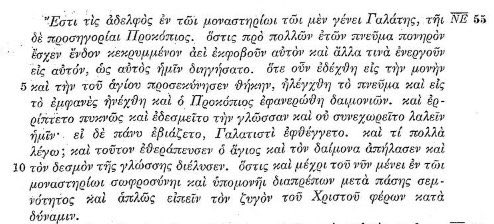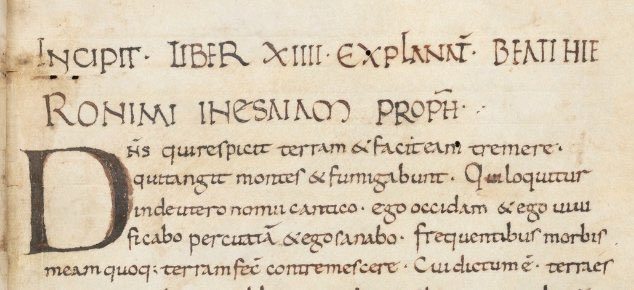Languages have been dying out in Late Antiquity too. Sometimes (well, most of the time actually) we learn about them in quite unusual ways. A little thread  https://abs.twimg.com/emoji/v2/... draggable="false" alt="🧵" title="Thread" aria-label="Emoji: Thread"> 1/
https://abs.twimg.com/emoji/v2/... draggable="false" alt="🧵" title="Thread" aria-label="Emoji: Thread"> 1/
Isidore, Etymologies, bk. IX.1 On languages
St. Gallen, Cod. Sang. 231 #medievaltwitter
Isidore, Etymologies, bk. IX.1 On languages
St. Gallen, Cod. Sang. 231 #medievaltwitter
Cyril of Scytopolis in his Vita of Euthymius, a 5th C. monk living in Palestine, describes the last known instance of spoken Galatian - a Celtic language from Asia Minor. A monk has been possessed and after he recovered he would only answer in his native language: Galatian. 2/
Jerome, translator of the Bible, was probably a native speaker of Illyrian and in his Commentary on Isaiah (written around 410) 7:19 preserved the local Pannonian Vulgar Latin word for beer: sabaium which derived probably from Illyrian. 3/
Ammianus Marcellinus also mentions sabaia a little bit earlier. Apparently emperor Valens was nicknamed by his enemies „a sabaiarius“ because he had a weakness for sabaia, „a drink of the poor in Illyricum, made from barley or some other grain“ (Amm. XXVI, 8.2) 4/
Anonymous Pilgrim from Piacenza, who went to the Holy Land around 570, wrote that monks at Mount Sinai spoke Latin, Greek, Syriac, Egyptian (Coptic) and "Bessian" - possibly the language of the Bessi, a Thracian tribe, one of the last mentions of Thracian. 5/
Zurich Ms. Rh. 73
Zurich Ms. Rh. 73
At some point I might do a thread on all the Latins that died out still in Late Antiquity like the British, Moselle, and African Romance and the whole „Romania submersa“. Or just leave it to @DannyBate4 because well, he is the expert here. 6/

 Read on Twitter
Read on Twitter 1/Isidore, Etymologies, bk. IX.1 On languagesSt. Gallen, Cod. Sang. 231 #medievaltwitter" title="Languages have been dying out in Late Antiquity too. Sometimes (well, most of the time actually) we learn about them in quite unusual ways. A little thread https://abs.twimg.com/emoji/v2/... draggable="false" alt="🧵" title="Thread" aria-label="Emoji: Thread"> 1/Isidore, Etymologies, bk. IX.1 On languagesSt. Gallen, Cod. Sang. 231 #medievaltwitter" class="img-responsive" style="max-width:100%;"/>
1/Isidore, Etymologies, bk. IX.1 On languagesSt. Gallen, Cod. Sang. 231 #medievaltwitter" title="Languages have been dying out in Late Antiquity too. Sometimes (well, most of the time actually) we learn about them in quite unusual ways. A little thread https://abs.twimg.com/emoji/v2/... draggable="false" alt="🧵" title="Thread" aria-label="Emoji: Thread"> 1/Isidore, Etymologies, bk. IX.1 On languagesSt. Gallen, Cod. Sang. 231 #medievaltwitter" class="img-responsive" style="max-width:100%;"/>





